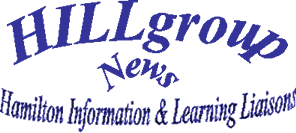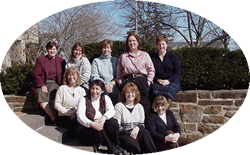
|
New
Library and Instructional Technology Services Collaboration ". . Professors design
programs, courses and assignments within courses that foster self-education
and produce that intellectual toughness, creativity and flexibility
necessary to excel in a rapidly changing world" ---Hamilton College
Catalogue (2001). Assisting faculty and students in the selection
and use of technology and information resources to support pedagogical
goals is the focus of the HILLgroup, the newly formed collaboration between
the Library and Instructional Technology Services. Our coordinated efforts will combine the best
technological tools and information resources with a discipline-oriented
approach to enhance teaching and learning.
The goal of the HILLgroup is to support faculty in the identification,
selection, and use of technologies and content applicable to their teaching
or research needs. The HILLgroup invites faculty who wish to utilize technology
and information resources in their teaching or research to become part
of a team along with a Reference Librarian and an Instructional Technology
Support Specialist. If you have an idea for
a project incorporating technology, contact us at HILLgroup@hamilton.edu.
Services The
HILLgroup offers the following support to the
Hamilton Community: ØAssist in database searching, current awareness services, delivery
of full text information, and bibliographic verification for publication Ø Assist with utilization and archiving of course information through
CourseInfo ØAssist with identification and selection of technological tools ØDevelop research skills that empower users to choose and effectively
use library databases and materials, and evaluate and organize resources Ø Offer hands-on sessions to familiarize and educate users in information
retrieval and management ØProvide information about cutting-edge technology in your discipline ØSuggest specialized software/hardware and provide instruction for
its use in faculty projects ØOffer
workshops such as "Thinking Critically about the Web" and
"Effectively Searching the Internet" Upcoming
Events
Ø The
HILLgroup
will be sponsoring a series of luncheons
where we can talk with faculty about information & technology needs. Your Invitation will be mailed soon!  Top row: Glynis Asu, Liz Miller, Lynn Mayo, Nikki Reynolds, Kristin Strohmeyer. |
Faculty
In the Spotlight: Sometimes
computers and technology are perceived as distorting or changing reality. Steve's use of technology to illustrate reality
is one of the primary advantages of using technological tools to provide
students with a more intuitive grasp of abstract or complex real concepts. Making biochemistry and molecular biology "real" to students
is very important to Steve. He
stresses that he attempts to "focus the use of technology "
on making "subject matter more identifiable" to the students. He uses technology to help them "learn
what they can know rather than what they don't know.”
Steve’s use of Bioinformatics software programs in his research led to a natural extension
of this technology into the classroom. In Biochemistry (BIO 346) students
use molecular biology software to design PCR (Polymerase
Chain Reaction) primers and model protein structure
(Swiss-Model) based on existing Crystal and NMR protein structures in the Swiss-Prot
database (http://www.expasy.ch). The software enhances their ability to visualize
and organize molecular information. They then enter the lab to clone
predicted fragments into an artificial protein expression system. Bioinformatics tools permeate Steve's other courses as well.
Computational Molecular Biology Seminar (BIO 443) students use software
(MacVector, Vector-NTI and Sequencher) and web-based servers (BLAST) to understand the molecular biological
and computational basis of genome sequencing projects such as the Human Genome Project. The context of the impact of such projects is studied by
using computer based Proteomics, and Functional Genomics
to apply "function"
to the rapidly generated <DNA sequences of many organisms>. Utilization of this electronic window has allowed integration
of research and teaching. Or,
as Steve puts it, "working with real biochemical problems using modern technology
makes the students experience more intuitive.” Steve uses a variety of information management and instructional
technology tools in his teaching. His students are exposed to PowerPoint presentations, CourseInfo, specialized software, and information
management and retrieval skills. The Biology Department stresses the
importance of students being able to locate and identify "good"
information. Glynis Asu, the reference librarian
for the sciences, assists in biology courses by
targeting online research skills, and then implementing these skills
within student lab sessions where students explore the resources in
a self-directed, hands-on environment.
Steve has found that students are already using web resources
and are comfortable with most technological tools.
He incorporates what they are already doing with technology into
applicable forums for his courses.
Check
out these Science
links: The Human Genome
Project - This is the entry page
for research, news, social & ethical discussions concerning the
human genome project. Online Mendelian Inheritance in Man - This database is a
catalog of human genes and genetic disorders. It also contains links
to NCBI's Entrez database of MEDLINE articles
and sequence information. The Virtual School of Biodiversity - An international collaboration that provides a web based
learning environment to promote understanding and conservation of biological
diversity. The
Wellcome Wing
of the British Museum of Science – take an interactive state of the
art tour of science and technology.
You may need to download the Shockwave plug-in
to get the full interactive effect. |